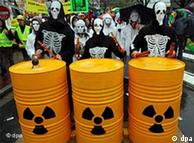Sweden's parliament on Thursday narrowly passed a government
proposal to begin replacing old nuclear reactors in the country by the
start of next year.
The close vote, 174-172, officially reversed a 1980 national
referendum that ordered the phasing out of nuclear power in the Nordic
country by 2010. The referendum's plan was later abandoned by officials,
who were struggling to find an environmentally-friendly replacement.
Sweden currently has 10 nuclear reactors, providing about 40 percent
of national energy demand. Critics say expansion of nuclear energy will
hurt the renewable alternative energy market, while the supporters of
the government plan argue nuclear power is a viable, low-carbon option.
 Bildunterschrift: Großansicht des Bildes mit der Bildunterschrift: The opposition hopes to reverse the bill after September elections
Bildunterschrift: Großansicht des Bildes mit der Bildunterschrift: The opposition hopes to reverse the bill after September elections
Platform reversal
Environment Minister Andreas Calgren said while he was skeptical
about nuclear power, he saw its benefits. He added that the bill was a
chance to "leave decades of political strife behind us."
"A few months ago, the climate threat dominated the environmental
debate. Now it is the oil disaster in the Mexican Gulf that is sparking
the world's interest in horror," Calgren told parliament. "Both are
really two sides of the same coin, namely, we must leave the dependency
on oil and fossil energy behind us."
The center-right government's plan was a large concession by
Calgren's Center Party, which has traditionally opposed nuclear power.
Indeed, two Center Party members broke party lines and voted against the
measure.
Victory short-lived?
The opposition Social Democrats, Green Party and Left Party strongly
opposed the plan and have threatened to reverse it if they win upcoming
elections in September. Current polls suggest most Swedes favor keeping
nuclear power plants, but the ruling and opposition parties are nearly
tied for voter support.
Green Party spokeswoman Maria Wetterstrand criticized the Center
Party for changing its traditional position and siding with its
coalition partners, and doubted the nuclear plan's long-term
sustainability.
 Bildunterschrift: Großansicht des Bildes mit der Bildunterschrift: Environmental groups across Europe have protested the use of nuclear energy"Nuclear
energy has become more expensive, and ongoing projects similar to
neighboring Finland have been delayed," she said during parliamentary
debate. "(The plan) could mean Sweden will be making itself dependent on
nuclear power for 100 more years, and there will be 100,000 years of
consequences for future generations who will have to take care of the
waste."
Bildunterschrift: Großansicht des Bildes mit der Bildunterschrift: Environmental groups across Europe have protested the use of nuclear energy"Nuclear
energy has become more expensive, and ongoing projects similar to
neighboring Finland have been delayed," she said during parliamentary
debate. "(The plan) could mean Sweden will be making itself dependent on
nuclear power for 100 more years, and there will be 100,000 years of
consequences for future generations who will have to take care of the
waste."
Britain, Italy and Finland have all made plans to bring new reactors
on line, and Germany's government hopes to extend the lifespan of its
nuclear reactors beyond the current 2022 cut-off date.
Author: Andrew Bowen (dpa/AFP/Reuters)
Editor: Nigel Tandy
http://www.dw-world.de/dw/article/0,,5697078,00.html









